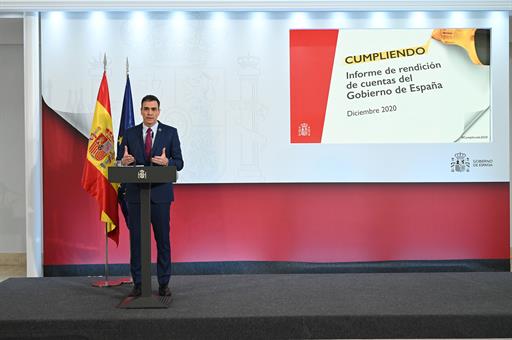Pedro Sánchez outlines extensive compliance with government commitments and points to 2021 as year for great recovery and confidence
President's News - 2020.12.29
Moncloa Palace, Madrid
This analysis of the government's action is an exercise in transparency, exemplary conduct and the fostering of ongoing improvements in public practices at the service of the people, which aspires to institutionalisation and to become part of the government's habitual performance regardless of changes in the political situation.
Pedro Sánchez declared that accountability "improves the quality of our democracy and reaffirms the value of giving one's word", and that this "strengthens institutions and returns confidence in politics by enhancing democratic quality".
"Times have changed and politics must change with the times. When Spain changes, its government also changes, alongside its society and its country. And the quality of our democracy changes", stated the President of the Government before setting out the details of the report "Complying".
In taking general stock, and despite the difficulties in 2020, the activation and compliance with the commitments has been greater than expected. Specifically, 90.9% of the 1,238 commitments taken on by the coalition government have been set in motion and close to a quarter - 23.4% - have already been met this year.
In light of the rapidity of compliance, the President of the Government acknowledged that "we are six months ahead of the scheduled compliance. But that is no reason for slowing down the pace; quite the opposite, we must steadfastly maintain this. We came here to change things and we are meeting the targets".
In this regard, the figures from an analysis of the report predict that compliance will hit 32.6% over the next six months, in other words, one third of the total after approximately one third of the term of office. The President of the Government considered the approval of the National Budget for 2021 to be decisive, which he feels will directly boost 33% of the commitments taken on.
2021: targets in a year of recovery and confidence
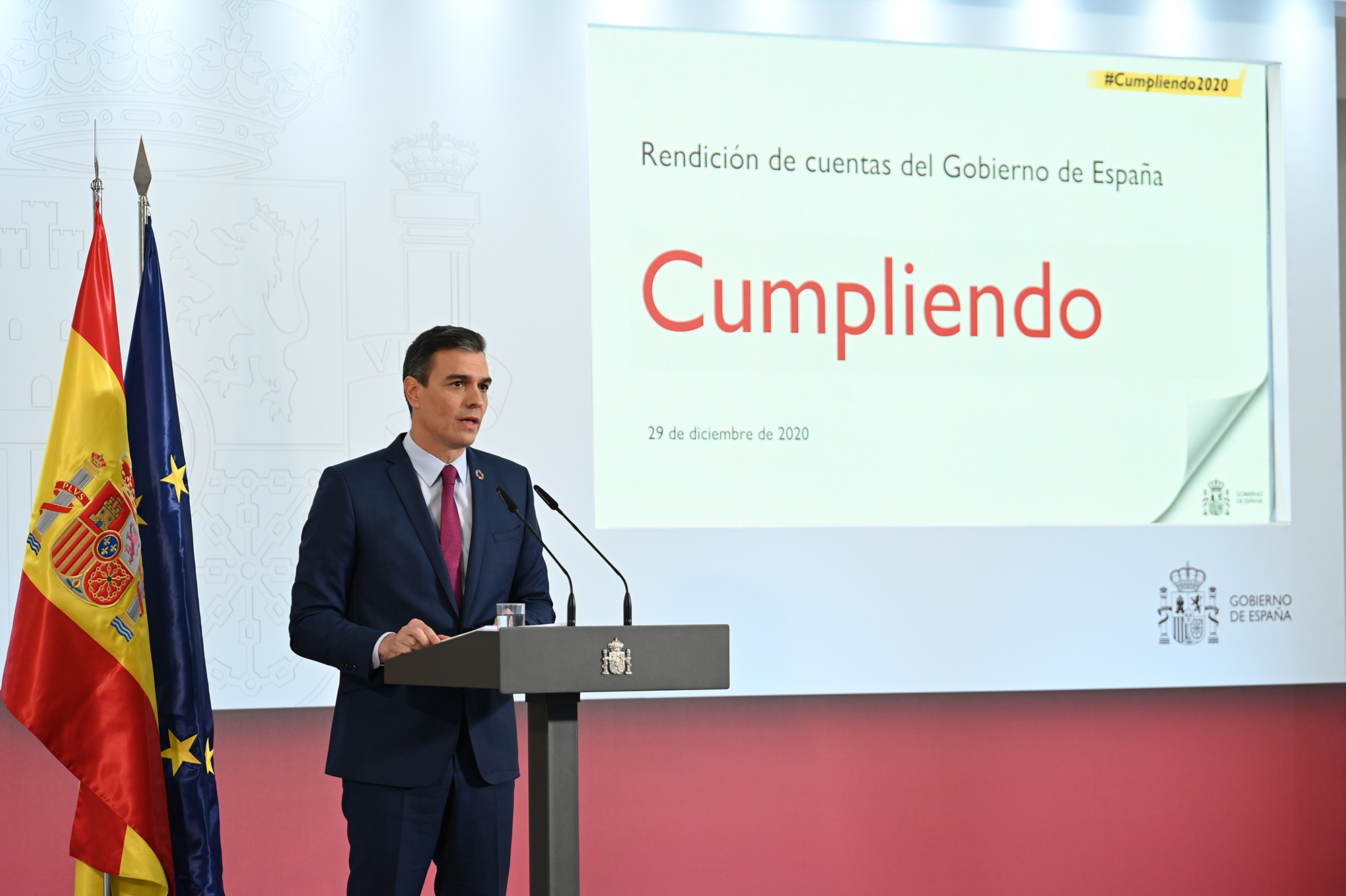 Pool Moncloa/Borja Puig de la Bellacasa
Pool Moncloa/Borja Puig de la Bellacasa
The President of the Government, Pedro Sánchez, described 2020 as the year of the great calamity, and profiled 2021 as a crucial turning point for our country. "I would like to state this very clearly; 2020 has been the year of great calamity and of great resistance. But 2021 may be, and indeed must be, the year of the great recovery, to which end we need great confidence".
Pedro Sánchez called for "great confidence" in ourselves as a country, and called for unity and agreement. "Through confidence, we reconquered our liberty and got rid of the dictatorship; we joined Europe with high expectations. I trust in Spain; I trust in the capacity of the Spanish people to overcome adversity".
In the first half of 2021, coinciding with the duration of one third of the term of office, the government plans to have completed some important projects we committed to, to complete 32.6% of the goals. The Cybersecurity Plan will be approved in this time, as will the draft bills of the Telecommunications and Audio-visual Communication Acts, which will give a major boost to the pillar of Digital Spain. Work is also being done on drafting the Digital Transformation of SMEs Plan. As regards the ecological transition, we can point to the draft bill of the Waste and Contaminated Soil Act and the future Mobility Act, which will include the creation of a National Mobility System.
Furthermore, the draft bill of the Sexual Liberty Act is being pushed through - one of the most important projects for a feminist Spain. Work is also being done on amending the legislation on agencies that offer surrogacy practices, and the Spain Plan to provide protection against male violence and the National Male Violence Strategy.
In relation to cohesive and inclusive Spain, the Constitutional Law on the Regulation of Euthanasia will shortly be approved. Work is also being done on the draft law on measures to enhance equity, universality and the cohesion of the National Health System, on a new Vocational Training Act, a Family Diversity Act, the first State Housing Act, the Spain: Entrepreneurial Nation Strategy, the draft bill of the Democratic Memory Act is being pushed through and work is being done on the Demographic Challenge Strategy. Lastly, the investigation phase of criminal cases has been extended and work is being done on the draft Criminal Procedure Act.
Political situation
Under the heading to take stock of the political situation, Pedro Sánchez pointed to the intensity of the legislative activity of the present government compared with the lack of movement in the previous era. "Two and a half years ago, Spain began a change of political cycle which, among other things, meant bringing to an end the least active era in the enactment of legislation in the history of our democracy", he said.
This activity responds to both the need to undertake the reforms and transformations that Spain needs and the outbreak of the pandemic at the start of 2020. On this latter point, Pedro Sánchez stated that since the start of the pandemic, the government has submitted, for their passage through Parliament, 10 draft laws and two draft constitutional laws, and has approved 34 royal decree-laws at the Council of Ministers.
"It was the government's responsibility to attend, without delay, to the emergency caused by the pandemic on all fronts. And to do this, moreover, with values that were completely different to those employed in the previous economic crisis. At this time - and I wish to remind you of this once again - the mandate is to come out of this united, without leaving anyone behind", he recalled.
An exceptional response in an exceptional time
The legislative activity in response to the COVID-19 pandemic has strengthened the principles of equality, social justice and progress that defined the investiture programme. The raft of measures in this field can be grouped into four main areas.
The first, measures are to support the health response, because the government's top priority was to save lives. To achieve that, the states of emergency, the lockdown measures and the Vaccination Strategy are just some of the government's decisions in this field, to which an unprecedented volume of both material and human resources allocated.
The government has guaranteed that protection be stepped up, through the obligatory use of face masks and controls on mobility, combining the temporary closure of borders with the authorisation of a pilot programme to open up safe tourism corridors. In addition, it has boosted research, not only through the approval of the Action Plan for Science and Innovation, with an investment in excess of 1 billion euros, but also through Spain's participation in the projects of the US pharmaceutical company Moderna, and the Jenner Institute of Oxford University.
The second field of action has been to reduce the inevitable economic impact of an unprecedented situation such as this pandemic. The ICO lines of guarantees have provided security for 578,000 companies, while specific plans have been designed for the tourism, agriculture, automotive, hotel and catering, culture, financial and energy sectors, and measures have been taken to protect SMEs and the self-employed, such as the benefit for the cessation of activity, which protected almost 1.5 million independent contractors, and new extraordinary benefits for more than 346,000 independent contractors.
The third area contains the so-called social shield - the measures designed for all to come out united, without leaving anyone behind, from the testing times we are all experiencing. With a special focus on vulnerable groups, the government has acted to avoid the emergency exacerbating an inequality gap that we simply cannot allow. The Minimum Living Income has been an historic action, but not the only one. Protection from evictions and from supplies being cut off are other more recent actions. But undoubtedly the most important action has been the extension of the Temporary Lay-Off Plans (Spanish acronym: ERTEs), which provided protection to 3.4 million workers at the toughest times of the pandemic. This measure was extended thanks to the three social agreements to retain jobs, signed by the trade unions and the employers' associations. We have had some worrying days in the field of the fight against gender-based violence, consumer protection and intense support through our network for enquiries for residents abroad.
The fourth area consisted of the recovery of activity in the world of academia, where investment in digitalisation and adaptation of evaluation criteria has served to combine an absolutely essential service with the necessary health and safety measures.
Within this raft of measures, the regional governments have been allocated an unprecedented fund in Spain's history - the COVID-19 Fund, with an allocation of 16 billion non-repayable euros for health, economic and educational actions, in addition to the suspension of fiscal rules as a fundamental tool for the actions of regional and local authorities.
Lastly, the approval of the National Budget has allowed the funds from the European Union to be channelled, with a total of 750 billion euros throughout Europe, of which Spain will be allocated 72 billion euros in direct transfers over the next three years.
Compliance by pillar and by transformation
The first pillar of the legislature expresses a commitment to digital Spain, with the aim of modernising the business fabric, its internationalisation and the renewal of technological capital.
In this field there are 90 commitments of which more than 71% are currently being implemented, while almost 27% are completed. These include the Digital Spain 2025 Strategy, the National Artificial Intelligence Strategy and the Connectivity and Digital Infrastructures Plan, together with the Strategy to Boost 5G Technology. In addition, the SMEs 2030 Strategic Framework has been approved, together with the Spanish Science, Technology and Innovation 2021-2027 Strategy.
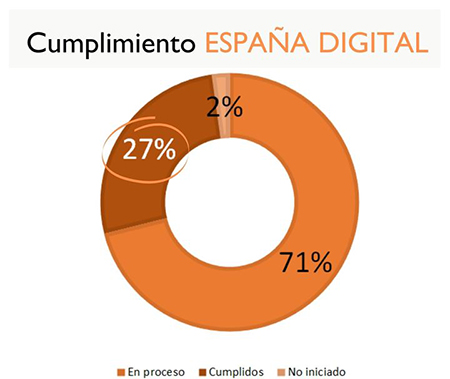 Pool Moncloa
Pool Moncloa
In the field of digitalisation, the forecast for June 2021 is to have met more than 32% of the targets.
The second pillar addressed the commitment to a green Spain, because our country needs a transformation of its productive model and the incorporation of a new paradigm of sustainability as a source of jobs and innovation.
The number of commitments to a green Spain amounts to 162. More than 70% are being implemented and almost 23% have now been completed. If we list some of them, we should mention the draft Climate Change and Energy Transition Act, which is in the last stage of its passage through Parliament, the Circular Economy Strategy, the National Integrated Energy and Climate Plan 2021-2030, which has been submitted to the European Union. In addition, we should mention the Hydrogen Roadmap, the Long-term Decarbonisation Strategy and the 2nd National Adaptation to Climate Change Plan 2021-2030.
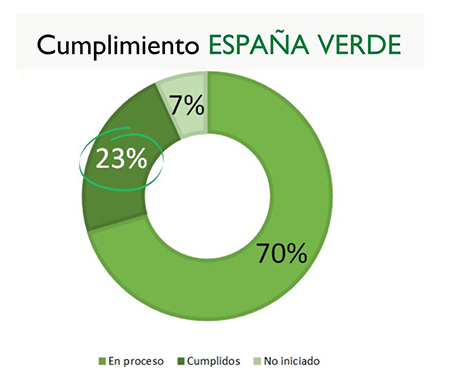 Pool Moncloa
Pool Moncloa
The forecast for June 2021 is to have met more than 30% of the targets in this area.
Thirdly, the pillar to eliminate the gender gap and for equality as a key driver of growth, justice and social balance, while maintaining economic efficacy.
The number of commitments to a feminist Spain amounts to 104. At this time, almost 59% have been activated and 31% have already been met in this first year, such as the boost to the VioOGén System, and the 3rd Equality Plan of the General State Administration, among others.
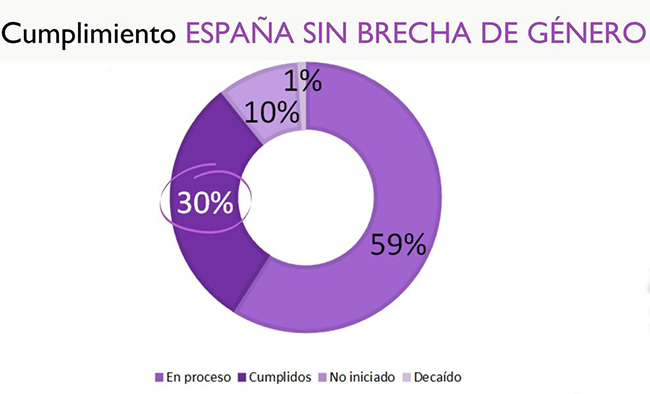 Pool Moncloa
Pool Moncloa
The forecast for June 2021 is for compliance with 47% of the targets.
The fourth pillar works towards a cohesive and inclusive Spain, with three key goals: to close social and territorial gaps, the development of the rural environment and inter-generational justice.
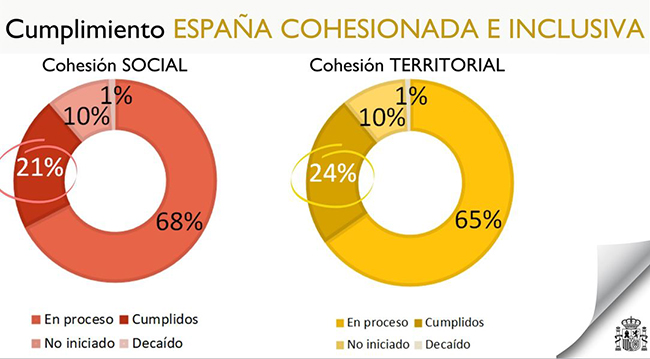 Pool Moncloa
Pool Moncloa
The number of commitments to a social Spain amounts to 520, and those related to a territorial Spain number 277.
At this time, more than 65% are being implemented in both fields, and around 23% of all the commitments have already been met in the first year alone.
The forecast for June 2021 is to have met almost 32%.
Accountability: Spain tops the table
Spain is on the international front line in this matter, thanks to methodological soundness, the ambition of the targets and the scope of the conclusions, a task headed up by the Department of Planning and Monitoring of Governmental Action, set up for this mission under the Secretariat-General of the Staff Office of the Presidency of the Government.
Furthermore, Spain is the first country to set up a Methodological Analysis Group, with the aim of establishing an independent external verification system that confirms the quality and accuracy of the work carried out.
This group, made up of independent experts from public universities, has analysed the methodology employed in this exercise in accountability to guarantee utmost internal coherence and rigour, incorporating the standards and criteria necessary to take reliable, objective stock that can be externally verified. The aim is to extend this external verification in the coming half-year periods, to include a complete validation of the different results presented.
The commitment taken on by the government with the Analysis Group was to promote and respect utmost freedom and autonomy in the development of its work, and in the drawing up of the corresponding conclusions and recommendations, many of them already incorporated in the methodology applied in this report presented on Tuesday.
Non official translation
More Info
- Transcript of press briefing by President of the Government of Spain following final Council of Ministers of year
- Report "Complying" (PDF - English)
- Annex I (PDF - English)
- Annex II (PDF - English)
- Report "Complying" (PDF - Spanish)
- Annex I (PDF - Spanish)
- Annex II (PDF - Spanish)
- Report "Complying" (PDF - French)
- Annex I (PDF - French)
- Annex II (PDF - French)





